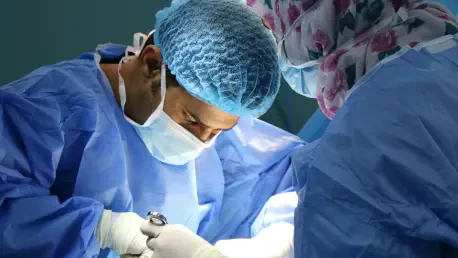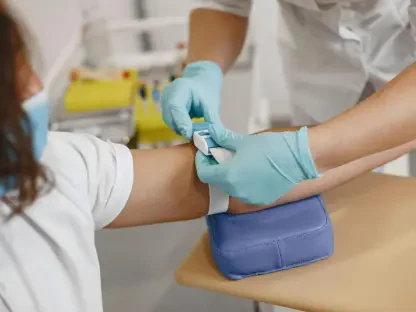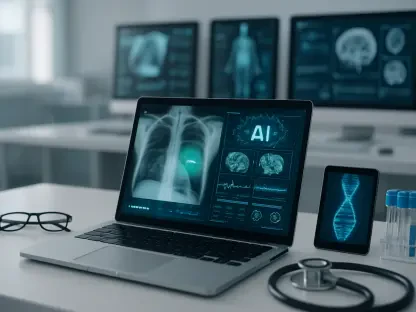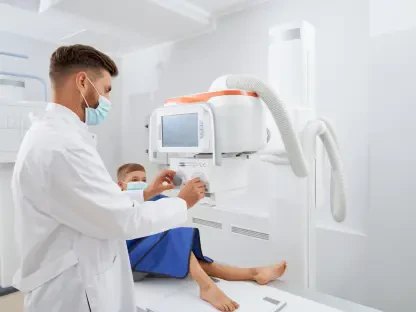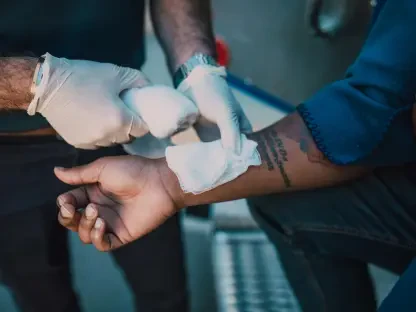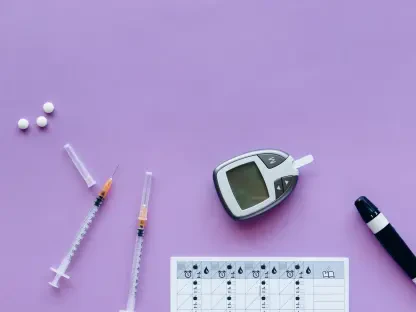In a striking example of how artificial intelligence is transforming the medical field, a groundbreaking project has emerged from the University of Central Florida (UCF), reshaping the landscape of surgical practices. Initially conceived as a tool to track cafeteria forks, the project evolved into an advanced AI system named AIMS — AI for Medical Surgery — now assisting in the complex realm of robotic surgeries. This innovation is tailored to support surgeons at Orlando Health, enhancing the precision and efficiency of surgical staple usage. Under the guidance of Laura Brattain, a renowned biomedical engineer at UCF, a group of dedicated engineering students developed this system, which demonstrates not only the potential of AI in medicine but also the power of academic-corporate partnerships. This collaboration between UCF and Orlando Health is a testament to how engineering ingenuity can address critical surgical challenges. AIMS is a pioneering step towards more sustainable surgical practices, facilitating reduced waste and improved resource management within operating rooms.
Development of AIMS and its Impact on Surgical Procedures
The journey of AIMS began as a Senior Design capstone course project at UCF, emphasizing practical product development by graduation. Through the integration of AI into surgical procedures, AIMS enhances operational efficiency, thereby reducing waste and bolstering sustainability. The system embarked on rigorous testing phases at Orlando Health’s operating rooms, closely monitored by Alexis Sanchez, the director of the robotic surgery program at Orlando Health Orlando Regional Medical Center. His active role ensured the system’s relevance and efficacy in clinical settings, demonstrating its capacity to bring tangible improvements to surgical processes. This real-world application underscores the system’s importance and the substantial role students play in translating theoretical knowledge into practical solutions. The collaboration between UCF and Orlando Health symbolizes a shared vision of healthcare innovation, where technology serves as a pivotal tool in refining patient care and surgical outcomes.
The operational mechanics of AIMS are rooted in its ability to track surgical staples during procedures. In robotic surgeries, ensuring precision in staple usage is crucial, as it directly impacts surgical outcomes and post-operative recovery. AIMS addresses the common challenge of accurately accounting for surgical staples, minimizing both excess use and waste. The system utilizes advanced AI algorithms to monitor staple placement, fostering greater accountability in surgical resource management. Unused staples, once removed from sterility-sealed packaging, often result in unnecessary waste. However, through the insights provided by AIMS, these issues are addressed, paving the way for more sustainable surgical practices. Sanchez’s involvement from the initial design phase through implementation ensured that AIMS not only met academic objectives but also aligned with the practical demands of a fast-paced clinical environment.
Collaborative Efforts and Educational Advancements
This pioneering venture underscores the vital role of interdisciplinary collaboration in pushing technological boundaries within healthcare. Laura Brattain’s diverse academic involvement at UCF reflects the fusion of medical and engineering disciplines. With secondary roles in both the College of Engineering and Computer Science and the College of Medicine, Brattain brings an interdisciplinary perspective that fuels innovation. Her focus on combining biomedical AI, medical ultrasound, and surgical robotics exemplifies the potential of converging various fields to tackle complex medical challenges. The collaborative atmosphere cultivated between UCF and Orlando Health creates a fertile environment for tackling intricate issues, spurring progress and instigating valuable innovations that ultimately enhance patient care and surgery efficiency.
This collaboration also signals significant strides in educational practices at UCF, especially with the reintroduction of pioneering courses like the Introduction to Medical Robotics. This course, revived after a decade, aligns with UCF’s commitment to integrating hands-on learning experiences into its curriculum. Engineering students are offered a unique opportunity to interact with cutting-edge medical technology, such as observing the Da Vinci robot at work. Such interactive experiences facilitate comprehensive learning, imbuing students with both theoretical knowledge and practical skills. The combination of in-class instruction and real-world observation bridges the gap between academia and industry, equipping students with critical competencies necessary for careers in innovative healthcare solutions. The course and student involvement were further enriched by Lillian Aguirre, a clinical nurse specialist, providing invaluable insights into clinical practices.
Challenges and Real-World Application
Developing AIMS was not devoid of challenges; the dynamic nature of operating rooms presented unique hurdles that required innovative solutions. The iterative testing phases exposed students to the complexities of real-world environments, where factors like lighting conditions and surgical dynamics could affect the system’s efficacy. For instance, camera calibration needed adjustment to ensure optimal performance in varying operating room settings. Issues such as surgical tools obstructing views and abrupt shifts in staple placement necessitated adaptive strategies and flexible thinking. This experiential learning was invaluable, providing students with an authentic understanding of the realities and demands of surgical environments. By refining camera angles and recalibrating system algorithms, the students addressed these obstacles, ensuring AIMS’s reliability and precision in diverse surgical contexts.
Moreover, the project highlights the essential role of experiential learning in academic growth. Allowing students to engage in complex, real-world scenarios underlined the importance of integrating practical experience into educational pathways. The close collaboration with seasoned medical professionals like Dr. Sanchez provided students unique insights into the interplay between technology development and its real-world application. Observing professionals in action and receiving feedback from experienced surgeons not only honed the students’ engineering skills but also opened their eyes to the tangible impacts their creations could have. This marriage of academic learning with practical application provides a powerful platform for students, nurturing the next generation of innovators poised to tackle pressing healthcare challenges with ingenuity and resolve.
Vision for Future Technological Applications in Healthcare
Artificial intelligence is revolutionizing the medical field, as seen through a notable project from the University of Central Florida (UCF). Initially designed to track cafeteria forks, this ingenious project morphed into AIMS — AI for Medical Surgery — a cutting-edge AI system now aiding in robotic surgeries. This technology specifically supports surgeons at Orlando Health by refining the precision and efficiency of surgical staple application. Spearheaded by Laura Brattain, a distinguished biomedical engineer at UCF, a team of engineering students developed AIMS, showcasing the profound impact of AI in healthcare and emphasizing the importance of collaborations between academia and industry. The joint effort between UCF and Orlando Health highlights how engineering innovation can solve significant surgical issues. Positioned as a pioneering advancement, AIMS promotes more sustainable surgical practices by minimizing waste and optimizing resource management within operating rooms, setting a new standard for the future of surgeries.
